Cricket has provided satisfying moments for fans
A. C. de Silva
CRICKET: The game of cricket has produced many interesting moments
and there has been some startling performances and incidents as the
world's top cricketers have come up with outstanding feats.
Test cricket has been the calls of the day and upto the end of the
1986 season only one of the 1,051 Test matches played has been won off
the last possible ball. At Kingsmead in Durban on 20th December 1948,
England;s ninth wicket pair Alex Bedser and Cliff Gladwin, needed 8 runs
from the final eight-ball over from Lindsay Tuckett. Before Bedser
brought the scores level off the sixth ball, all four results were
possible.
|
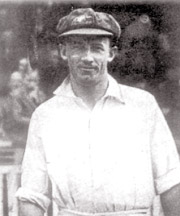
Sir Donald Bradman - Australia
|
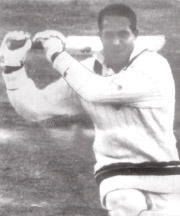
Sir Garfield Sobers- West Indies
|
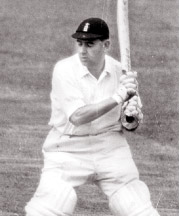
Sir Colin Cowdrey - England
|
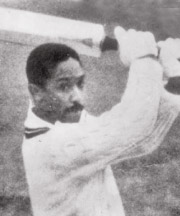
Sir Frank Worrell - West Indies
|
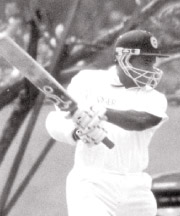
Sanath Jayasuriya - Sri Lanka
|
Gladwin missed the seventh ball. He also missed the last ball. It
bounced off his thigh and the batsman managed to scamper a leg-bye.
There is also an interesting story that the only Test team to be
dismissed twice in a day is India. This happened at Old Trafford,
Manchester, on 19th July 1952. The Indian team were bowled out by
England for 58 and 82 in a total batting time 3 1/4 hours, 22 wickets
falling in the day.
There is also of the story that only eight uninterrupted days of Test
cricket have failed to produce the fall of a wicket; five of them have
occurred in the West indies, one in Australia, one in India, one in Sri
Lanka and none in England.
Batting - the showpiece
As any cricketer would promptly say that batting is the showpiece of
cricket. There are many stories about the great cricketers of the past
doing various marvellous things on the field of play.
However, if the recorded facts are correct, the only pair of batsman
to bat throughout two consecutive days of Test cricket are: Garfield
Sobers (now Sir) and the late Sir Frank Worrell. Garfield Sobers (226)
and Frank Worrell (197 not out) on 9 and 10 January - the fourth and
fifth days of the First Test between West Indies and England at
Kensington Oval in Bridgetown, Barbados did bat. The final hour of the
fourth day was lost to rain and a rest day intervened. Their
fourth-wicket partnership of 399 occupied 9 hours 39 minutes the longest
stand in Test cricket.
|
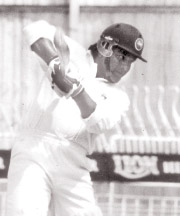
Arjuna Ranatunga - Sri Lanka
|
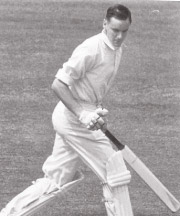
Peter May - England
|
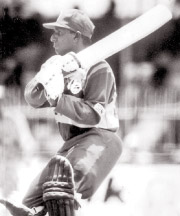
Aravinda de Silva - Sri Lanka
|
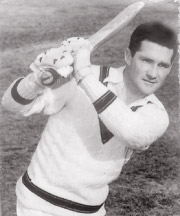
Neil Harvey - Australia
|
Scoring a century gives immense pleasure to the individual and brings
great joy to the team. But when five players from one team score
centuries in the one innings, there naturally will be immense
satisfaction to that particular team. Did this happen in June 1955.
The West Indies made a total of 357 and then it was the turn of
Australia and the Aussies took up the Challenge and ran up the huge
score of 758 for 8 wickets and then declared. For the Aussies, Colin
McDonald (127), Neil Harvey (204), Keith Miller (109), Ron Archer (128)
and Richie Benaud (121) made centuries. Benaud reached his hundred in 78
minutes - the third fastest in Tests then.
While the majority of cricket lovers will beat the drums and shout
out their joy when a batsman slams a quick-fire century, their is also
some people who would talk about the slowest Test hundred in teams of
both minutes and balls faced. In Pakistan there was Test cricketer
Mudassar Nazar who opened the side's batting against England at the
Gaddafi Stadium, Lahore on December 14-15 in 1977 opening the innings on
a dead mud-pitch, scored 52 in 330 minutes on the first day.
Ten minutes after tea on the second day (25 minutes of play having
been lost to a minor riot when he reached 99), he took his score to 100
out of 306 for 3. It was the slowest hundreds in all first class cricket
then. Mudassar Nazar's innings of 114 lasted 514 minutes.
Don Bradman - fastest double century
We have dealt with the slowest Test century, then at the same time it
is nothing but right that we should think about the fastest scoring
rate. There was that master-batsman Sir Donald Bradman. The fastest
double century in Tests was recorded by Donald Bradman during his 334
for Australia against England at Headingley, Leeds on 11 July 1930.
Bradman reached his 200 in 214 minutes, his century having taken 99
minutes.
|
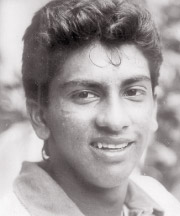
Roshan Mahanama - Sri Lanka
|
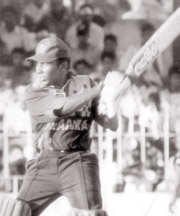
Mahela Jayawardena - Sri Lanka
|
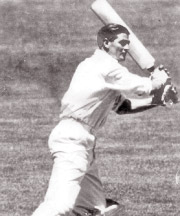
Keith Miller - Australia
|
There was also that attacking batsman. Ian Botham of England. He
reached his double century off only 220 balls (268 minutes) during his
innings of 208 for England against India at the Oval on 8th and 9th July
1982 - the fastest recorded 200 in Test cricket in relation to the
number of balls he faced.
While talking about the fastest scoring rate, it is also interesting
to note about the slow scoring. The longest that any batsman has taken
to score his first run in a first-class innings has been recorded as 97
minutes. The batsman in this instance is Godfrey Evans of England.
Playing against Australia at Adelaide on February 5 to 6, 1947, Godfrey
Evans joined Dennis Compton (40 not out) with England's second innings
total 255 for 8 wickets. Evans survived 20 balls that evening, while
Compton scored 19 runs off 60 deliveries.
When play started the next day, Evans scored his first run off the
61st ball and allowed Compton to reach his second century of the match.
When England were sage from defeat and Hammond declared, Evans had
scored 10 runs off 98 balls, and Compton 63 out of his 103 not out off
179 balls in a partnership of 85 in 133 minutes. Five years later, Evans
amassed 98 runs before lunch off India's bowlers in a Test at Lord's.
West Indies - glamour team
The West Indies, have more often that not, been the glamour team of
after the Australian dominated period of Sir Donald Bradman.
It is on record that West Indian star Clyde Walcott was out for
nought only once during his Test career. He played 74 innings for the
West Indies between January 1948 and March 1960, scoring 3,798 runs
(average 56.68) and making 15 centuries. His solitary 'duck' came about
at Brisbane on 9th November 1951 when Ray Lindwall had him LBW in his
first Test innings in Australia.
It is also on record, but not a very happy occasion that a Sri Lankan
had a career record bowling average of 284.00 that's Roger Wijesuriya in
four matches between 1982 and 1985. He bowled 586 balls - the most by
any bowler taking only one wicket in Tests.
The highest number of overs bowled in any first class innings is 598
by Sonny Ramadhin for West Indies during England's second innings at
Edgbaston, Birmingham in June 1957. The 5ft 4 inch wrist-soinner took 2
for 178 in 98 overs as Peter May (285 not out) and Colin Cowdrey (154)
batted England to safety, adding 411 in England's highest-ever
partnership. Ramadhin's total of 174 balls bowled in that match remained
as a Test record for a long time.
Well, Sanath Jayasuriya - the star left-hander in Sri Lanka has left
the Test scene, but cricket fans will not forget the glorious innings of
340 he made against India at the R. Premadasa Stadium will remain in
memory for a long, long time. Sri Lanka made the massive world record
score of 952 for 6 wickets. India made 537 for 8 wickets declared when
they batted first.
Mahela and Sangakkara - 624 runs
When Sri Lanka batted, Sanath Jayasuriya made 340 and Roshan Mahanama
made 225 and Aravinda de Silva 126, Arjuna Ranatunga 86, Mahela
Jayawardena 66. That massive score of 952 for 6 wickets is Test
cricket's highest score.
The second-wicket partnership between Sanath Jayasuriya and Roshan
Mahanama realised 576 runs.
The record partnership of 576 runs was surpassed in July 2006 as the
largest partnership in Test match history by fellow Sri Lankans
Kumar Sangakkara and Mahela Jayawardena who put on 624 runs against
South Africa.
Sri Lanka 952 for 6 wickets at Premadasa Stadium
SCORE BOARD
India 1st Innings: 537 for 8 wts dec
Sri Lanka 1st Innings
S.T. Jayasuriya c Ganguly b Chauhan 340
M.S. Atapattu c Mongia b Kulkarni 26
R.S. Mahanama lbw b Kumble 225
P.A. de Silva c Prasad b Ganguly 126
A. Ranatunga run out 86
D.P.M. Jayawardena c Kulkarni b Ganguly 66
R. S. Kaluwitharana not out 14
U.C.J. Vaas not out 11
Extras (B-27, LB-10, W-7, NB-14) 58
Total (for 6 wikts at stumps) 952
Fall of wickets: 1-39, 2-615, 3-615, 4-790, 5-921, 6-924.
Bowling: Prasad 24-1-88-0 (W-4),
Kuruvila 14-2-74-0 (NB-4),
Chauhan 78-8-276-1 (W-3, NB-5),
Kumble 72-7-223-1 (NB-5),
Kulkarni 70-10-195-1,
Ganguly 9-0-53-2,
Tendulkar 2-1-2-0,
Dravid 2-0-4-0.
Man of the Match : S.T. Jayasuriya (Sri Lanka) |

